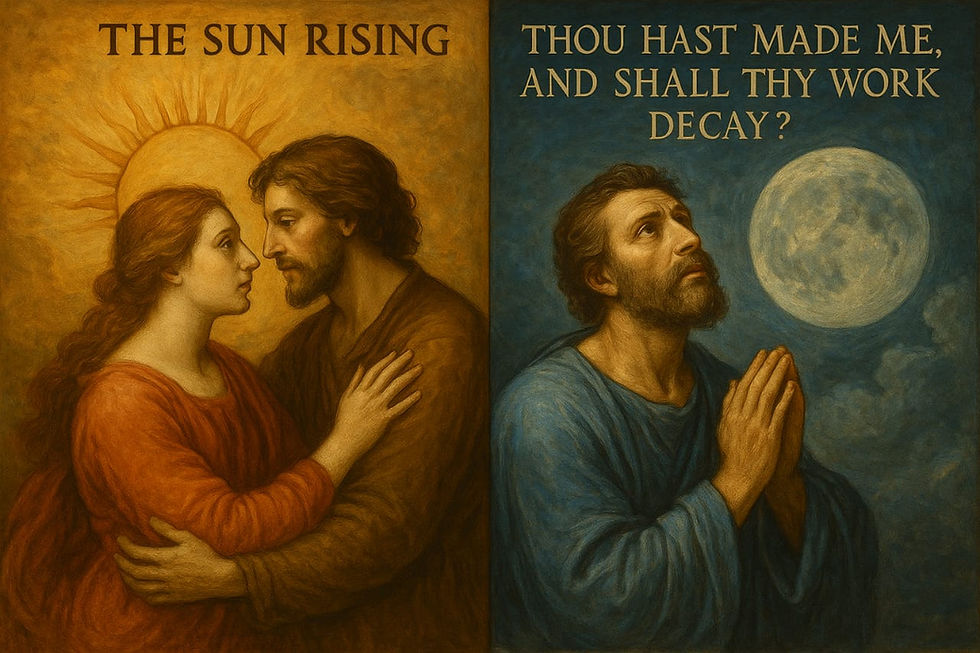John Donne's "The Sun Rising" and "Thou hast made me, and shall thy work decay?" both explore the themes of human experience and transcendence but through different lenses—earthly love and divine
- Musleh Saadi

- Sep 12
- 4 min read
Comparative Analysis of John Donne's "The Sun Rising" and "Thou hast made me, and shall thy work decay?"
John Donne's poetry is famously rich in its examination of human existence and the relationship between worldly life and religious belief. Two of his poems, "The Sun Rising" and "Thou Hast Made Me, and Shall Thy Work Decay?", are notable for this dichotomy. "The Sun Rising" is a poem that glorifies human love and its ability to change the world, whereas "Thou Hast Made Me" is concerned with the vulnerability of the soul and the necessity of divine grace. Comparing these poems, we can observe how Donne describes both worldly and spiritual things and how they are sometimes distinct but often intertwined.
One of the most important poetic devices used by Donne is the metaphysical conceit. This is to say that he draws odd and creative parallels between things and ideas. In "The Sun Rising," the poet addresses the sun boldly as an "unruly sun" (line 1), accusing it of disrupting his love. The poet then states, "This bed thy center is, these walls, thy sphere" (line 30), implying that his love is at the center of all existence. This hyperbole sets love above all, even the forces of the cosmos. On the other hand, "Thou Hast Made Me" employs a conceit that emphasizes human frailty. The speaker presents himself as a deteriorating thing, stating, "Thy hand, repair me now" (line 4). Here, Donne is emphasizing human weakness and the soul's reliance on God for mending.
The tones of these poems are quite different as well. "The Sun Rising" is a cheerful and assertive poem. The speaker feels that love surpasses money, time, or status. He even declares, "All honor's mimic, all wealth alchemy" (line 22), i.e., honor and riches are not authentic or precious in relation to love. The tone is lighthearted and abound with conceit of love's potency. However, "Thou Hast Made Me" is written in a very serious and somber mood. The speaker senses the guilt of sin and the certainty of death, for he says, "I run to death, and death meets me as fast" (line 5). It shows fear and urgency in pursuing God's mercy. The speaker is praying and begging that God would intervene and save him. These two moods—one loving the power of love and the other grieving over human frailty—reveal the difference between the subjects of the poems.

Imagery is also a dominant feature of Donne's poetry. In "The Sun Rising," imagery is vivid and animate. Time and power are represented by the sun, but the poet attempts to downplay its significance, addressing it as, "Shine here to us, and thou art everywhere" (line 29). This line indicates that love is so strong that the sun only exists to cater to it. The poem is warm and celebratory in its tone. But "Thou Hast Made Me" contains far darker imagery. The speaker talks of himself as "decaying" (line 4), highlighting the onset of time and the dread of death. He further declares, "I dare not move my dim eyes" (line 7), indicating his weakness and reliance on God. This change of imagery from radiant, warm in "The Sun Rising" to somber, rotting in "Thou Hast Made Me" emphasizes the contrast between the two poems.
These differences also show how Donne perceived the physical and spiritual worlds. In "The Sun Rising," worldly love is handled as if it were divine. The speaker regards love as potent enough to construct the universe and make everything else, including the sun, irrelevant. He offers that love has the power to transcend the limitations of the physical universe. However, "Thou Hast Made Me" adopts a very dissimilar view. The speaker here is aware that the material universe is transitory and that man requires God for salvation. The cry for God's assistance proves that human love and strength alone are insufficient to battle spiritual decay. Divine grace is required instead.
By showing these two viewpoints, Donne achieves an equilibrium in human existence. He demonstrates that love on earth has immense value—it can produce pleasure, significance, and even transcendence. But he also recognizes that love and life are fleeting, and that salvation for the soul will be required eventually. This kind of complexity richens and engrosses Donne's poetry. He does not merely take sides in the debate but rather enables both sides to coexist simultaneously.
"The Sun Rising" is energetic and self-assured, demonstrating the speaker's faith in the power of love. The lighthearted voice and hyperbolic comparisons assure the reader that, at this moment, love is the epicenter of everything. "Thou Hast Made Me," on the other hand, reveals the speaker's terror and awareness of human frailty. The poem emphasizes the necessity of divine mercy, reminding the reader that mere human strength is insufficient.
Generally, Donne's capacity to discuss human love and religious dependence simultaneously gives his poetry its distinctiveness. His employment of metaphysical conceits, varying tones, and strong imagery enables him to explore these topics in a manner that is both personal and universal. "The Sun Rising" exalts human love as something remarkable, while "Thou Hast Made Me" subdues the speaker in the presence of God's power. This contrast reveals Donne's profound insight into the joys and challenges of life. His writing encourages readers to consider the interplay between love, religion, and human life, and thus his poetry remains timeless and relevant.
References:
Donne, J. (1633). "The Sun Rising".
Donne, J. (1633). "Thou hast made me, and shall thy work decay?".
HThe differences between these poems reveal that Donne's nuanced perspectives on material and spiritual realms. In "The Sun Rising", earthly love is exalted as a microcosm of the universe; this implies that human connection possesses its own divinity. This, in turn, emphasizes the possibility that love transforms and transcends the mundane.
Conversely, "Thou hast made me.," struggles with the transience of the material world and the soul's final accountability to its maker. This view recognizes the weakness and frailty of human existence, making a case for redemption through divine intervention.
This duality underlines that Donne can approach both realms equally profoundly, validating the transcendent significance of lovhttps://medium.com/@musleh.saadi/john-donnes-the-sun-rising-and-thou-hast-made-me-and-shall-thy-work-decay-766b185931e2e while



Awesome 👌
Amazing 👍
Good jb 👏